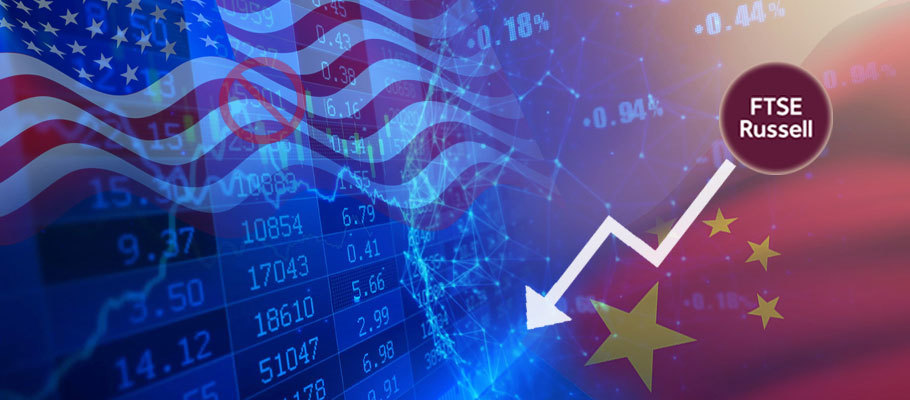
Published: July 12th, 2021
A global index plans to delete 20 more Chinese companies from its indexes following adverse user feedback. The move follows an updated U.S. executive order, which restricts U.S. investment in companies with alleged connections to the Chinese military.
Global index publisher FTSE Russell has announced that it would remove 20 more Chinese companies from its indexes following user feedback on an updated U.S. executive order. The said order restricts U.S. investment in companies said to have ties to the Chinese military.
On June 3, President Biden signed an order that deters U.S. entities from investing in Chinese companies with connections to surveillance technology or defense sectors. This new instruction replaces an earlier one released during the Trump administration.
A note on the index publisher's website said it would remove the additional stocks from its indexes on July 28.
The Chinese government has condemned the action, timing it as ill-motivated. Wang Wenbin, China's foreign ministry spokesman, said that eliminating quality Chinese companies from the indexes hurts the indexes in question and soils their reputation.
In a regular briefing in Beijing on Friday, July 9, he added that the U.S. is unjustifiably oppressing Chinese companies.
Some of the stocks the publisher plans to expunge are aerospace companies such as Aerospace CH UAV, Avic Aviation High-Technology, Avic Aircraft, and Avic Heavy Machinery. Other companies on the list include China Shipbuilding Industry, Inner Mongolia First Machinery Group, and CSSC Offshore & Marine Engineering Group.
The mentioned stocks would be deleted from the FTSE Global China A Inclusion indices, FTSE GEIS, and associated indices. Initially, FTSE Russell removed other Chinese companies, including Semiconductor Manufacturing International Corp, Hangzhou Hikvision Digital Technology Co., and Nanjing Panda Electronics, from its indexes following U.S. sanctions.
While FTSE Russell plans to delete 20 more stocks, two U.S. indices have settled on 25 equities they want to eliminate. The London-based FTSE Russell's actions would be complete by the end of July, whereas the two American, the S&P 500 and Dow Jones Industrial Average, plan wait until August 2 to eliminate the selected China stocks.
The action spells trouble for the U.S.-listed Chinese companies.
Already, the said firms are dealing with Beijing's broad efforts to curtail the reach of its tech sector and impose tighter data security measures.
In the past decade, the U.S. capital market has been a flourishing source of funds for Chinese companies. In particular, technology companies that want to benchmark their valuations against their American peers and enjoy the potentials of the big liquidity pool have enjoyed the expanse of the U.S. market.
Despite publicly siding with its companies, China has changed its stance the past week. It cracked down on several companies and undertook cybersecurity investigations on firms that seek to list in the U.S.
Didi Global Inc., a ride-hailing giant, became Beijing's prominent target just days after completing its successful $4.4 billion listing on the New York Stock Exchange. The scrutiny pushed Didi's shares down for the fourth consecutive day on Friday, July 9, after Beijing ordered mobile app stores to delete the cab-hailing app.
The stocks that S&P 500 and Dow Jones Industrial Average have earmarked for elimination include ZH Electronic Measuring Instruments Co Ltd and North Navigation Control Technology Co.
Under an order signed during the Trump era, S&P 500 deleted Luokung Technology Corp. However, the index now says that the company can apply for reenlisting under President Biden's fresh order.
Despite what seems like China's attempt at making life complicated for its companies, the country has vowed to defend the interest of the same firms over what it calls unfair targeting from the U.S.
Wenbin said China would take every necessary measure to safeguard the legal rights and interests of its companies. He added that Beijing rejects the U.S. attempts to interfere in his country's internal affairs.
The spokesman slammed Washington for politicizing economic and trade issues, adding that attacking Chinese entities goes against international rules and hurts investors throughout the globe, including those in the U.S.
China's threats do not seem to faze the U.S. According to another Reuters report, the United States Commerce Department would block ten or more Chinese companies over human rights abuse allegations in Xinjiang Province.
The U.S. has consistently blocked Chinese companies and individuals over reports of mass surveillance and force labor among the Uighurs, a Muslim ethnic minority in China. However, Beijing has consistently and vehemently refuted the claims and instead accused Washington of meddling in its internal affairs.
While China says that delisting affects everyone, experience shows that Chinese companies have suffered adversely. When the New York Stock Exchange deleted the three biggest telecoms companies in China, their shares dropped by as much as 5% in Hong Kong on the first trading day after the announcement.
In this particular episode, the casualties were China Mobile Ltd, China Telecom Corp Ltd, and China Unicom Hong Kong Ltd. The three were delisted because the U.S. government blocked public investment from the country, going into 31 firms that the U.S. said had affiliations with China's military.
Aside from what China calls the abuse of the state's power, delisting the companies from the indices deprives them of essential capital. During the January incident, the American Deposit Receipts (ADRs) that the three telecoms companies listed had a combined market value of just under 20 billion yuan (approx. $3.1 billion) of the firms' equity.
Besides, deleting the companies from the American and European indexes creates short-term selling pressure on the stocks. The ADR shareholders often prefer to convert their holding to preferable shares, mainly Hong Kong, before selling.
Removal from international indices might also lead to selling by index funds. However, China said it does not anticipate any sustained oversell because the affected companies are primarily domestic. Besides, their sound fundamentals, China stocks' strong recovery trends, and the country's positive cash flow will prevent any effect of delisting.